Doing Business With the Consumer Product Safety Commission

4330 East-West Highway<br> Bethesda, Md. 20814-4408 <br>(301) 504-6816<br><a href="http://www.cpsc.gov">www.cpsc.gov</a>
4330 East-West Highway Bethesda, Md. 20814-4408 (301) 504-6816 1972 Hal Stratton Mary Sheila Gall, Thomas Moore About 480 The Consumer Product Safety Commission is an independent, federal regulatory agency that protects the public from hazards related to about 15,000 consumer products, including toys, cars, appliances among other things. It develops, issues and enforces standards, sometimes banning products if they pose an irreversible threat to the public. It issues product recalls and arranges for repair, if necessary. It performs research and compiles reports on products, works with industry to develop voluntary standards, and seeks to educate consumers. Regional offices in New York, Chicago and Oakland, Calif. There are six offices reporting to the chairman: congressional affairs, equal employment and minority enterprise, general counsel, inspector general, secretary and executive director. The executive director's office oversees agency policy and administration. $60 million $56.7 million $55 millionThe fiscal 2004 budget request reflects a $3.2 million increase over 2003 "to maintain our current safety program and prevent further reductions of our safety purchasing power," according to the agency's 2004 Budget Request and Performance Plan.XXXSPLITXXX- Chief information officer 2001 Gaithersburg, Md. Mount Airy, Md. Golf, helps coach a high school girls' soccer team "Theodore Rex" by Edmund MorrisWeddle: Not radically different than most agencies, largely office automation and e-mail. Although we collect and maintain a large amount of incident data, etc., that we use to help determine risk. What makes us a little different is that we have tried to make integrating that information a priority, and we're focusing on making our safety information availableWeddle: CPSC has an incredible mission. We save lives and reduce injuries to people, and every one of us is committed to that. However, our overall budget and our IT budget are small. We can't afford to make mistakes, so we work hard to get the right product at the best cost.Weddle: Technology has allowed us to collect and analyze information faster than ever. Consequently, we can make decisions faster. Our Web site and e-mail distribution lists get important information out to the public and media as soon as an action is taken. Weddle: Many of our paperbound systems already have been moved to an electronic form. Many of our efforts have been administrative, such as procurement, time keeping and human resource systems. But we've made many of our reports and systems electronic, allowing us to retrieve them from anywhere on the network. The entire collection of information is searchable using a Web-based search engine. Moving in that direction is slow; but it's going well.Weddle: A good fit. We look for companies that understand what our needs are. We have an incredible IT staff. However, many companies want to sell an enterprise solution. We don't want to reinvent the wheel, so we look for a product fit.Weddle: Not significantly different than today, but evolving ? same emphasis on providing more information to the public and to staff as quickly and efficiently as possible.
www.cpsc.gov
Founded:
Chairman:
Commissioners:
Employees:
What it does:
Major offices:
Number crunching
2004 budget request:
2003 budget:
2002 budget:
 Full title:
Full title:
Took the job:
Hometown:
Home now:
Hobbies:
Currently reading:
WT: Are your technology needs different from the typical needs of an agency?
WT: Given what your agency does, does it make you a savvier IT customer?
WT: How has technology changed your agency?
WT: How have you transformed your paperwork into electronic files?
WT: What do you look for in companies with which you are thinking of doing business?
WT: A year from now, where do you see the agency's technology capabilities?
www.cpsc.gov
Founded:
Chairman:
Commissioners:
Employees:
What it does:
Major offices:
Number crunching
2004 budget request:
2003 budget:
2002 budget:

Patrick Weddle
Courtesy of CPSC
Took the job:
Hometown:
Home now:
Hobbies:
Currently reading:
WT: Are your technology needs different from the typical needs of an agency?
WT: Given what your agency does, does it make you a savvier IT customer?
WT: How has technology changed your agency?
WT: How have you transformed your paperwork into electronic files?
WT: What do you look for in companies with which you are thinking of doing business?
WT: A year from now, where do you see the agency's technology capabilities?